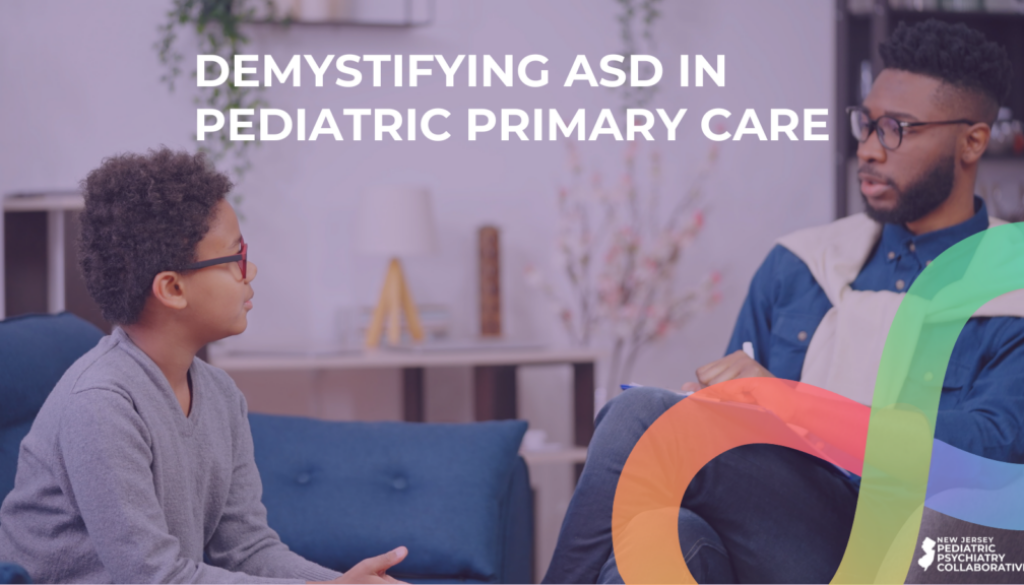Demystifying ASD in Pediatric Primary Care
By Debra E. Koss, MD
ASD is a neurodevelopmental disorder that presents in early childhood with persistent deficits in social communication and social interaction and restricted, repetitive patterns of behavior, interests, or activities. ASD is an umbrella term that describes a range of presentations with varying symptom intensity and possible co-existing conditions. Children with ASD may also present with unique strengths and a distinctive way of interacting with their world. However, the core symptoms of ASD cause significant impairment in daily life.
The Diagnostic and Statistical Manual of Mental Disorders, Fifth Edition (DSM-5) outlines the core symptoms required for diagnosis:
- Social communication deficits include:
- Deficits in social-emotional reciprocity,
- Deficits in nonverbal communication
- Deficits in developing and maintaining relationships
- Restricted repetitive patterns of behavior include:
- Stereotyped or repetitive behavior or speech
- Insistence on sameness or inflexible adherence to routines
- Highly restricted, fixated interests that are abnormal in intensity or focus
- Hyper- or hypo-reactivity to sensory input
A case example can be helpful in providing insight into ASD and how these core symptoms may present in children.
Case
Dr. S prepared to see her next patient, Noah, a 24-month-old boy presenting for a well visit. The nurse indicated that Noah withdrew anytime she attempted to interact with him, and the mother reported Noah had a three-month history of hitting and biting. Dr. S considered possible causes of these behaviors, including attention seeking, response to stressors in the home, or language/communication challenges. Dr. S entered the exam room and noticed that the child was sitting on the floor with his back to the door and was rocking back and forth. Dr. S sat near the mother and spoke in a soft, reassuring tone. The mother noted that the hitting started three months ago about the same time that Noah’s younger sibling was born. Noah seemed to become distressed any time the infant cried and often covered his ears. Before that, she worried about Noah’s hearing because he didn’t respond when she called his name. The mother also noted that Noah learned to call “Ma” and “Da” but had no other meaningful language. She reported that Noah was difficult to soothe, withdrew from touch, and avoided direct eye contact. He showed no interest in playing with any of his toys but was “obsessed” with keychains. At this point, Dr. S noted that Noah had stopped rocking but showed no interest in engaging with her. Dr. S organized the remainder of her evaluation, including screening for Autism Spectrum Disorder (ASD).
According to the CDC, ASD affects 1 in 36 children in the US and is four times more common in males than females. Given the prevalence of ASD in children, the American Academy of Pediatrics (AAP) recommends surveillance and screening in the primary care setting. This includes:
- Surveillance for social and communication skills using developmental milestones at all visits
- Screen at 18 and 24 months using a specific screening test, the M-CHAT (Modified Checklist for Autism in Toddlers-Revised)
- Reassess at well child visits if new concerns arise
When increased risk is identified through screening or surveillance methods, children should be referred for comprehensive evaluation. Diagnosis of ASD is based on a clinical evaluation that confirms the presence of DSM V criteria. In addition to direct observation and interaction with the child, diagnostic evaluation includes a review of developmental and medical history, standardized ASD assessment tools, and assessment for possible co-existing medical or psychiatric conditions. Evaluation is often conducted by a multidisciplinary team including, child and adolescent psychiatrists, developmental pediatricians, psychologists, speech/language therapists, occupational therapists, and physical therapists.
Best outcomes for children with ASD are associated with timely diagnosis and early intervention. Improved prognosis is also linked with the absence of associated intellectual disability, language impairment (functional language by age 5 is a good prognostic sign), and additional mental health problems. Treatment planning begins with a primary focus on early and effective interventions.
Treatment for ASD may include:
- Applied Behavioral Analysis (ABA)
- Communication Supports
- Cognitive Behavior Therapy
- Social Skills Training
- Life Skills Training
- Parent Coaching
These services may be delivered through early intervention programs, School-based Individualized Education Plans, 504 plans, or community providers. While medications have not demonstrated benefit for the core features of ASD, the FDA has approved the use of two atypical antipsychotics, risperidone and aripiprazole, for the treatment of aggression and irritability in children with ASD. Medications are also used to treat symptoms of associated conditions, such as ADHD, anxiety, depression, and others.
Pediatricians serve a key role for children with ASD, advancing early identification through surveillance and screening; linking families to medical professionals and providers specializing in ASD; providing a medical home and coordinating collaboration between providers and systems of care; helping parents to interpret information from evaluations to make informed treatment decisions; and offering anticipatory guidance and surveillance/management for common co-occurring conditions. Pediatricians in New Jersey may access additional resources by enrolling with the New Jersey Pediatric Psychiatry Collaborative (NJPPC), including access to ASD educational webinars, consultation with a child and adolescent psychiatrist to address comorbid mental health issues, and family access to clinical navigators who will assist with linkage to treatment resources in the community.
The NJPPC hosts Learning Collaborative all year-round related to mental health topics with CME credit and MOC Part 2 points available for NJPPC members. To become an NJPPC member, click here to register: https://tinyurl.com/4t7e767e
Previous Learning Collaborative sessions and webinars are available on-demand here: https://njaap.org/mental-health-collaborative/mhed-webinars/
Author Profile:


Debra E. Koss, MD
Clinical Assistant Professor, Department of Psychiatry Rutgers-RWJMS
NJPPC Project Manager for the New Jersey Psychiatric Association
Additional Sources:
ASD Diagnosis in Primary Care, American Academy of Pediatrics https://www.aap.org/en/patient-care/autism/
Modified Checklist for Autism in Toddlers
https://www.aap.org/en/patient-care/screening-technical-assistance-and-resource-center/screening-tool-finder/modified-checklist-for-autism-in-toddlers-m-chat-rf/




